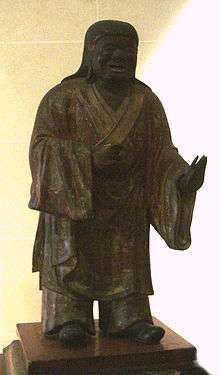Fudaishi

Statue of Fudaishi at the Musee Guimet
Fudaishi 傅大士 (a.k.a. Fu Ta-shih)(c. 490–c. 560) was a Chinese Buddhist monk who was later deified as the Japanese patron deity of libraries.[1] He is traditionally accredited with the invention of the rinzō (輪蔵), a system of revolving shelving used in Kyōzō libraries.[2] He is often represented alongside his sons, Fuwaku and Fukon.[3]
Fudaishi is noted for his "lecture" on the Diamond Sutra, recorded in the Hekiganroku (Record of the Blue Cliffs). According to this account, Fudaishi was invited to speak by the Emperor Bu-tei. He stepped up to the lectern, struck it a blow with his staff, and then returned to his seat without speaking a word.[4][5]
He is regarded as in incarnation of Miroku, the Waiting Buddha.[1]
References
- 1 2 Louis Fr?d?ric; Louis-Frédéric (2002). Japan Encyclopedia. Harvard University Press. p. 194. ISBN 978-0-674-01753-5.
- ↑ Daisetz Teitaro Suzuki (27 September 2012). Manual Of Zen Buddhism. Netlancers Inc. p. 132. ISBN 978-1-62394-103-1.
- ↑ Iso Mutsu (13 December 2013). Kamakura: Fact and Legend: Fact and Legend. Tuttle Publishing. p. 277. ISBN 978-1-4629-0871-4.
- ↑ Zenkei Shibayama (13 December 2013). A Flower Does Not Talk: Zen Essays. Tuttle Publishing. p. 14. ISBN 978-1-4629-0971-1.
- ↑ Zhiyu; Hakuin (1977). Every End Exposed: The 100 Koans of Master Kidō : with the Answers of Hakuin-Zen. Autumn Press. p. 22. ISBN 978-0-394-42069-1.
This article is issued from
Wikipedia.
The text is licensed under Creative Commons - Attribution - Sharealike.
Additional terms may apply for the media files.